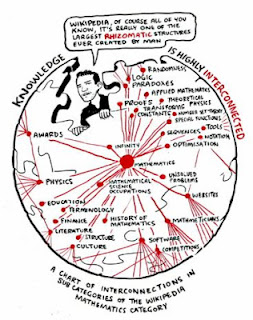Imagine living in medieval times, when weird and unexplained phenomena, especially those related to strange subjective experiences (such as feeling that you're being suffocated by demons in your sleep), were seen as indications and evidence of malevolent spiritual forces at work. In the famous Bull of 1484, for instance, Pope Innocent VIII (don't you love the irony of these names?) declared that:
Fortunately, and as usual, science has helped to shed some light on this otherwise dark and obscure phenomenon, saving people from medieval persecution and from forced mental institutionalization by discovering some of the underlying mechanisms at work, as well as their ubiquity because, believe it or not, it happens to most of us...
If you know someone whose life has been affected by the fear that they are being visited by probing aliens or haunted by evil spirits in the middle of the night, you might want to show them this video and assuage those feelings of fear and anguish...
And in case you are not aware of the distinction between an incubus and a succubus, and assuming these demons were not gay, incubi were 'seducers' of women, while succubi were 'seducers' of men, although if they're having their way with you while you're paralyzed, I'm not sure that would really count as 'seduction'...
members of both sexes do not avoid to have intercourse with evil angels, incubi and succubi, and that by their sorceries, and by their incantations, charms and conjurations, they suffocate, extinguish, and cause to perish the births of women [among many other evil things].As Carl Sagan recounts in his book, The Demon Haunted World, "with this Bull, Innocent initiated the systematic accusation, torture, and execution of countless 'witches' all over Europe." This would lead to the publication of the infamous Malleus Maleficarum (the "Hammer of Witches"), one of the most vile, irrational, fearsome and cruel documents in all of human history. There's a chance even Hitler might have shuddered at it... Yay religion!?
Fortunately, and as usual, science has helped to shed some light on this otherwise dark and obscure phenomenon, saving people from medieval persecution and from forced mental institutionalization by discovering some of the underlying mechanisms at work, as well as their ubiquity because, believe it or not, it happens to most of us...
If you know someone whose life has been affected by the fear that they are being visited by probing aliens or haunted by evil spirits in the middle of the night, you might want to show them this video and assuage those feelings of fear and anguish...
And in case you are not aware of the distinction between an incubus and a succubus, and assuming these demons were not gay, incubi were 'seducers' of women, while succubi were 'seducers' of men, although if they're having their way with you while you're paralyzed, I'm not sure that would really count as 'seduction'...




























